TIACA
Brings Its Message
To India
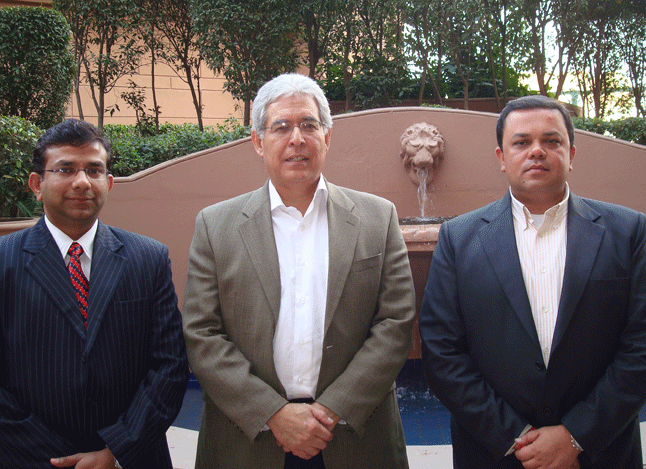 Three
For India—TIACA Secretary General Daniel Fernandez (c) with
two Trustee members: (L) Sanjiv Edwards, Associate Vice President
(Commercial) Delhi International Airport Limited and (r) Madhav
Kulshreshtha. Three
For India—TIACA Secretary General Daniel Fernandez (c) with
two Trustee members: (L) Sanjiv Edwards, Associate Vice President
(Commercial) Delhi International Airport Limited and (r) Madhav
Kulshreshtha.
|
The India growth
story has been causing a ripple effect around the world.
The air cargo sector has been one of the
first to be affected.
So, when The International Air Cargo Association
(TIACA)’s Secretary General, Daniel Fernandez came calling, the
message that emanated was simple: India’s air cargo sector had
arrived.
The growth in the air cargo industry in
India has attracted the attention of global trade associations like
TIACA that are keen to promote their membership in the region.
Perhaps, more than ever, the Indian air
cargo sector could do with TIACA’s membership.
As the country’s economy moves ahead
and makes its place among the top, the air freight sector—long
relegated to second-rung status after passenger—could use a strong
voice internationally. What TIACA would like to do is assist policymakers
in effectively addressing security issues around the world.
Given its membership across the air cargo
supply chain and its international focus, the association is uniquely
positioned to address issues such as international harmonization, security
protocols for international cargo and best practices.
Today, in addition to Air India, Delhi
International Airport and Traxon India, the number of members from the
country does not cross a dozen.
In comparison, the Middle East has 40-odd
members.
Initial hesitation had, perhaps, stopped
organizations from becoming members. In addition, many in the industry
believe that TIACA and similar international organizations are bodies
that do little except hold meetings and seminars. Trade bodies are often
groups funded by the companies from the industry that they serve and
their sole purpose is to promote the sector through publicity and lobbying
for the improvement of the industry.
These associations are also networking
facilitators with members from across the world.
Daniel Fernandez hastened to correct the
notion in an exclusive one-to-one with Air Cargo News FlyingTypers.
“We have been involved in networking,”
he said, “and, in fact, we are the top networking group in the
industry worldwide.
“That’s why most of our members
have joined the organization so that they can have access to those networking
operations. “However, we feel we can do more for the industry.”
TIACA’s mission, said the Secretary
General, is to advance the interests of the air cargo industry and further
the expansion of world trade.
Members of the association comprise CEOs,
directors, and heads of cargo and general managers who understand the
importance of being part of a strong, global industry association and,
in particular, the numerous networking opportunities TIACA provides
to meet other industry leaders from around the world.
Indeed, TIACA is shaking off these negative
connotations to let the air cargo industry around the world know why
membership is a very good idea indeed.
Fernandez went on to mention that in the
last few years the association had developed and strengthened contacts
with similar organizations like FIATA, IATA, etc.
“A lot of good work has been done
by FIATA, IATA and all the other organizations,” he said, “and
we are not going to supplant that . . . Instead, we are working very
closely to complement and support each other for maximum impact.
“We have identified those areas
and one of them is security.
“Our representatives in Washington
and Brussels regularly attend meetings and we are truly encouraged by
the progress that we are starting to see happening.”
TIACA, said Fernandez, was committed to
initiatives and policies that promote “the highest standards of
operational security and safety in the worldwide air cargo industry.
“Security and safety are inherent
in the very nature of air transport and have, for many years, been subject
to the most stringent international regulation by ICAO and other inter-governmental
authorities.
“What TIACA can bring to the table,”
emphasized Fernandez,” is a varied unique membership.
“We form a perfect platform to bring
different parts of the industry together to discuss different issues
and we bring different flavors to issues.”
The idea is simply to smooth the flow
of cargo traffic around the world.
Said Fernandez, “After all, if there
is a problem in one section of the supply chain, then the whole supply
chain is disrupted.
“Our committees comprising the members
do not air airlines’ views or freight forwarders’ views
but those of the industry which is very powerful and the people in Washington
and Brussels know that that is the industry speaking in one voice.”
He added, “we feel it is important
to continue doing things that are important for the industry.
“What we are doing is taking the
industry view to the people who are in charge of setting the regulations
that govern the industry.
“In that we are becoming more active
than we were ever before.”
Acknowledging the fact that TIACA had
taken a long time to come to India – in fact, it will take quite
a while before the association has a firm foothold in the country –
Daniel Fernandez said,
“One of the issues that I would
like to address is how the Indian industry perceives the security and
environment issues and include those in the views that we want to put
forward in Washington.”
As for India, Fernandez said that while
“TIACA has been in the region, we are not very well known in this
part of the world.
“We want to be better known in several
markets in this part of the world and India is one of them.
“So, we are finding the best way
we can to address them.”
During his visit, the Secretary General
held several meetings with leaders from the industry “to see what
impact we can make in this region.”
Fernandez’ trip was to gain an insight
on a first-hand basis.
As he put it:
“It is a listening trip and an exploratory
one.
“We want to talk to first hand players
and find out what the issues here are.” These issues, he pointed
out, were common to those in “our part of the world and I want
to see how we can use the resources that we have for the benefit of
our members, for the benefit of our industry or gaining the knowledge
that we feel is important to us to bring our work to this part of the
world.
“We have had preliminary discussions
and there are many things that we could bring,” he said.
“India is a big market for the industry
and we are just scratching the surface,” he said.
“TIACA needed to make a connection
and that means having a presence here. “I think we would love
to have an annual general meeting in Delhi or probably in Mumbai,”
but it will not be just yet.
“I think we can look forward to
that in the next couple of years. But first of all we need invitations
from the local bodies and we would welcome that.”
Madhav Kulshreshtha, a TIACA Trustee Member
of long standing, who was at the meeting with The Secretary General
added:
“There is no doubt that air freight
is witnessing rapid change and increasing complexities in cross-border
trade. Today more than ever, the Industry has to clearly distinguish
between regional and global issues and approach them on a common platform,
along with all stakeholders.
“TIACA, is perhaps one such organization,
with members ranging across all segments of the industry and the globe,
that offers such a platform.”
Tirthankar Ghosh |




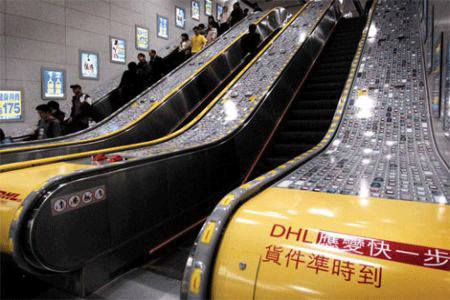
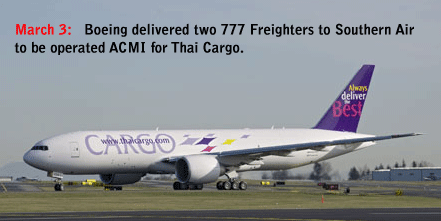
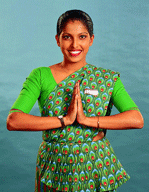
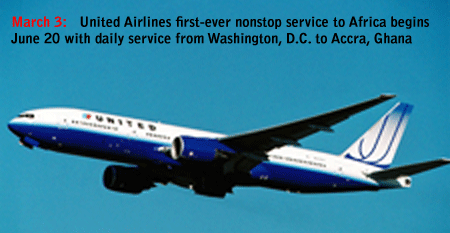
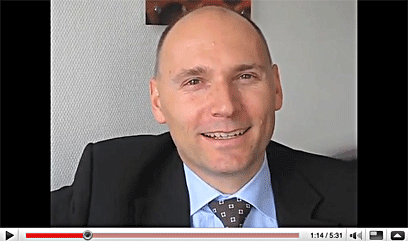
![]()
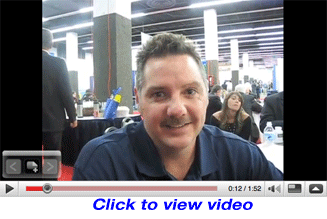
![]()
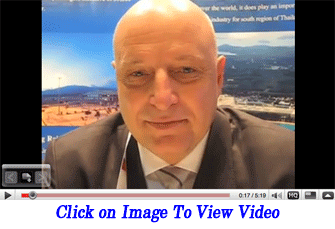
![]()